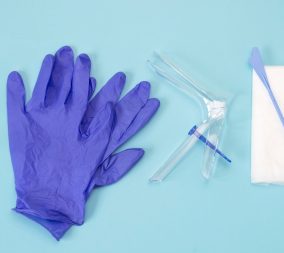Annual visits to Kamm McKenzie have many components that vary throughout one’s life. We have discussions about contraception, sexual health, menstrual bleeding, pregnancy planning, and/or menopausal concerns to name a few items. For younger healthy women, we are often your primary care provider. Part of most annual visits is a physical exam including a clinical breast and pelvic examination and discussion about health maintenance screening examinations you may have upcoming. One small, albeit important, part of the visit is cervical cancer screening with Pap smears and HPV testing.
We at Kamm McKenzie are updating our Pap smear guidelines to follow the most recent recommendations. In the past, many women have been advised to have annual Pap smears or Pap smears every 3 years. The most recently updated guidelines as of April 2021 have changed to increase the duration between screenings due to our evolving knowledge of how cervical cancer develops. We (the proverbial “We” as in those who practice in women’s health) have learned it takes many many years to go from an abnormal Pap to cervical cancer, thus allowing us to space out the time between screenings.
Our updated guidelines are summarized below:
- Women aged 21 to 29 should have a Pap smear every 3 years.
- Women aged 30 to 65 should have a Pap smear with HPV testing every 5 years.
- Women aged 65 and older can stop having Pap smears if their last two tests have been completely normal and they have no history of high-grade abnormality in the last 20 years.
As with any test that occurs in the office we must weigh the risks and benefits of the testing modality. Almost all women who have been sexually active will be exposed to HPV during their lifetime. Most HPV infections will be transient, meaning they will resolve on their own (your body’s immune system will clear active viral infection). Some HPV, however, will be persistent; and those are the infections that need to be followed more closely as they risk becoming cancer over time. We now know it takes 3-7 years for high-grade changes to become cancer. Women with low-grade changes can be tested more frequently to see if their cells go back to normal or progress to high-grade abnormalities. Women with high-grade changes can get treatment to have the cells removed and hopefully eliminate their risk of cancer. We know there are risks to treatment including discomfort, anxiety, increased healthcare costs, and if multiple procedures are done to the cervix, it can cause an increased risk of adverse pregnancy outcomes. Overall, studies have indicated that annual screening has similar cancer detection rates to the above new screening guidelines while doubling or tripling the downstream interventions.
If you pay attention to ONE thing in this blog, we want it to be that these new pap smear guidelines are for low-risk individuals. We will continue to provide patient-specific screening for those of you with more recent pap smear abnormalities, recent treatment for high-grade abnormalities, or certain high-risk conditions such as immunosuppression or HIV. When our providers or nurses relay your results to you they will likely say something like, “Your pap was normal and HPV was negative. We plan on seeing you again for your annual exam in a year and your provider and you can discuss optimal timing for your next pap smear.”
Again we are fortunate you continue to trust us with your care, and look forward to continuing to care for you for years to come. If you would like to read more please follow the links below.
Sources:
https://www.acog.org/womens-health/faqs/cervical-cancer-screening


















